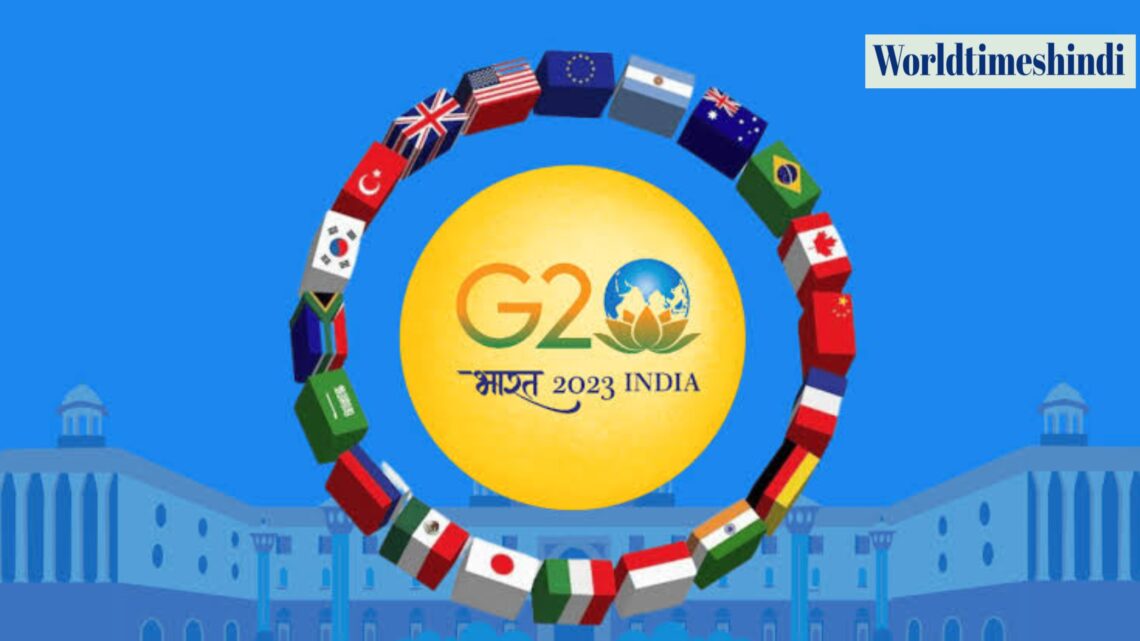In this article, we will explore the background, development, and significance of the G20 summit. The Group of Twenty, or more commonly known as the G20, is an international forum comprised of major advanced and emerging economies. Founded in 1999, the G20 has grown into a crucial platform for addressing global economic challenges and fostering cooperation among its member nations.

Genesis of the G20
The late 1990s economic turmoil is when the G20 first came into being. Finance ministers and governors of central banks from 19 nations and the European Union met in Berlin in December 1999 in the wake of the Asian financial crisis. The goal was to establish a conversation and coordinating space for issues related to global financial stability. A wide range of countries were represented by the participants, including the US, Japan, Germany, China, India, Brazil, and many others.
The First G20 Leaders’ Summit
With the commencement of the world financial crisis in 2008, the G20’s reach extended beyond conferences of finance ministers. Heads of state and government gathered for the first G20 Leaders’ Summit in November 2008 in Washington, D.C., to discuss the economic unrest. With the summit, the G20’s focus shifted significantly from being a financial forum to a platform for discussing more general global issues.
Key Objectives and Agendas
The G20 summit primarily focuses on addressing pressing global economic and financial issues. Some of its key objectives and agendas include:
Economic Stability:
coordinating actions to fight financial crises and encourage growth in order to promote global economic stability.
Trade and Investment:
Facilitating international trade and investment to foster economic growth and development.
Global Governance:
Discussing reforms in international financial institutions like the IMF and the World Bank to make them more representative and effective.
Climate Change:
Addressing climate change, sustainable development, and energy security.
Social Issues:
Discussing social issues such as gender equality, poverty reduction, and inclusive development.
Health Crises:
Addressing global health crises, as seen during the COVID-19 pandemic.
Membership and Organization
The European Union and 19 other nations make up the G20. Argentina, Australia, Brazil, Canada, China, France, Germany, India, Indonesia, Italy, Mexico, Russia, Saudi Arabia, South Africa, South Korea, Turkey, United Kingdom, and the United States are among these nations.
The G20 uses a system of alternating presidency. One member nation holds the presidency and hosts the summit each year. The presidency is in charge of organizing the year’s debates and determining the agenda. Prior to the Leaders’ Summit, the hosting nation typically arranges a number of gatherings, such as those for the finance, foreign, and labor ministers.
Impact and Significance
The G20 has established itself as a key forum for international economic governance. Its choices and suggestions for public policy have a significant impact on the global economy. Its significant accomplishments include:
Coordination During Crises:
The G20 played a vital role in coordinating responses to the 2008 financial crisis and the COVID-19 pandemic, helping stabilize the global economy.
International Reforms:
It has pushed for reforms in international financial institutions, giving emerging economies a greater voice.
Trade Facilitation:
The G20 has worked to reduce trade barriers and promote free trade, facilitating global commerce.
Climate Action:
It has promoted climate action and sustainable development, with commitments to reduce carbon emissions.
Challenges and Criticisms of G20
Despite its accomplishments, the G20 nevertheless faces difficulties and criticism. Some claim that the organization lacks inclusion and openness, with decisions frequently being made by a small number of powerful nations. Furthermore, it may be difficult to reach agreement among its various membership and that the implementation of its obligations may be uneven.
Conclusion
Since its establishment, the G20 meeting has changed significantly, transitioning from a venue for discussing financial crises to one that now addresses a broad variety of international issues. The G20’s role in promoting global cooperation and coming up with solutions is still essential as the world faces complicated economic, social, and environmental problems. The G20’s history and relevance show the value of multilateralism and communication in tackling global issues and determining the course of our connected world’s future.
FAQs
What is G20 in India?
The New Delhi G20 summit is, in a highly symbolic way, the conclusion of the Global North’s year-long quest to geopolitically win over the Global South.
Which country is in the G20?
The members of the G20 are: Argentina, Australia, Brazil, Canada, China, France, Germany, India, Indonesia, Italy, Japan, Republic of Korea, Mexico, Russia, Saudi Arabia, South Africa, Türkiye, the United Kingdom, the United States, the African Union and the European Union.
Which country will host the G20 Summit in 2024?
Rio de Janeiro, Brazil is slated to host the 19th G20 Summit in 2024 as per the International Institute for Sustainable Development.
Where is G20 summit 2023 in India?
The Union Cabinet in its meeting today passed a resolution hailing the success of the New Delhi G20 Summit, held on 9-10 September 2023.
what is the theme of G20 summit 2023 ?
the theme ‘One Earth, One Family, One Future’.
Where is headquarter of G20?
The G20 does not have a permanent secretariat or Headquarters.
Who is the current president of G20?
This announcement has been made by Indian PM Narendra Modi who is the current chairperson of the G20 Summit 2023.
Who is the largest G20 investor in India?
the UK is the largest G-20 investor country in India.
How many countries are members of G20?
The G20 comprises nineteen countries and the European Union (EU).
What is the official language of the G20 Summit?
The official languages of the G20 Summit are all languages English, French and Spanish, but the most prominent official language of the G20 Summit is English.



